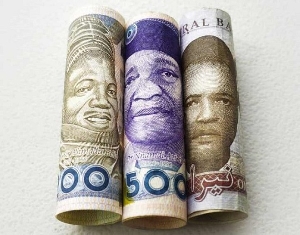Nigeria‘s supersized interest rate hike failed to stem the naira’s decline, with the West African country’s currency slumping to a fresh record against the dollar on the official market.
Nigeria’s currency weakened 2.1% to 1,615.94 per dollar in the so-called NAFEM window on Tuesday, according to data published by FMDQ, which calculates the exchange rate. It is the lowest the currency has traded against the greenback since Bloomberg started compiling the data.
The move shrugs off a much-bigger-than-expected 400 basis points rate increase from the Central Bank of Nigeria that lifted its policy benchmark to a record high 22.75%.
“There is still lots to do apart from tightening naira liquidity,” said Samantha Singh-Jami, Africa strategist at Rand Merchant Bank. The nation still needs to deal “with the FX backlog, and boosting FX liquidity is key.”
The naira has been sapped by a local scarcity of dollars and an outstanding backlog of demand for the US currency that the central bank has been steadily trying to work down.
In the unofficial parallel market, the naira traded at 1,600 per dollar on Tuesday from 1590 the previous day, according to Abubakar Mohammed, chief executive of Forward Marketing Bureau de Change Ltd., which tracks the data in Lagos.
Read More: Nigeria Springs Record Rate Hike in Bid to Restore Naira Trust
Central bank governor Olayemi Cardoso, speaking to reporters after Tuesday’s decision, said the currency was suffering from various distortions, including the activities of speculators, but efforts to unify the official and unofficial markets would yield fruit.
He also acknowledged that there was a trade-off between pursuing economic growth and taming inflation, but policymakers were convinced they couldn’t achieve the former without securing low and stable price growth.
Trade-Off
Analysts said that trade-off could have a visible short-term impact on the Nigerian economy.
“Regarding the rate hike’s implications, we expect to see its knock-on effect on GDP growth over the next few quarters,” FBNQuest analysts Tunde Abidoye and Tobi Ehinmosan said in emailed note on Wednesday.
“Although we anticipate 3.1% GDP growth in 2024, the actual GDP might fall short of our prediction due to the restrictive monetary policy conditions and the ongoing squeeze on household wallets.”
The naira has depreciated 44% versus the dollar this year, making it the second-worst performing currency in the world behind the Lebanese pound.
Business News of Wednesday, 28 February 2024
Source: bloomberg.com
Nigeria's Naira hits fresh record low despite jumbo rate hike
Entertainment












